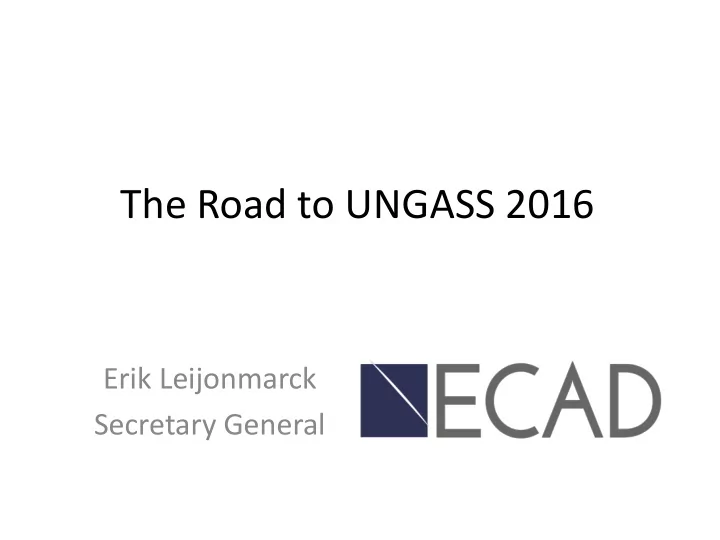

The Road to UNGASS 2016 Erik Leijonmarck Secretary General
# Advocacy: 250 Drug Free European Cities # Exchange of best practices
The Global Drug Situation leading up to UNGASS • Narcotic Drugs have existed for thousands of years but wasn´t a global problem until … • 1700 - 1900s when drugs were legalized and widely exported as commodities by the major powers at the time • Affected countries could give in to or resist the drug trade
China fought the traffickers Source: World Drug Report 2009
but legalized the trade in opium under gunpoint Source: World Drug Report 2009
1906-1961: Beginning of Drug Control Why: – Drug use spread across the globe (truly transnational phenomenon) – Drug Trade became a morally questionable source of revenue How? – Bilateral Conventions to ban and regulate the trade were partly succesful but lacked universal adherence
1961-2015 Contemporary Drug Control Limit the use of drugs to medical and research purposes only 1961: Opiates, Cocaine, Cannabis 1971: Psychotropic Substances 1988: Illicit Trafficking Continuous revisions, every 10 years (1998,2009, 2019)
The UN Conventions – a Success Story!
Action Plan of 2009 • Demand reduction • Supply Reduction • Cooperation Against Money Laundering and promoting judicial cooperation agains drug trafficking
What is UNGASS 2016? - and why should we care? • Special session on drugs in general assembly in the UN • Evaluation of the UN:s Action Plan counter narcotics efforts 2009-2019 – Mexico, Colombia and Guatemala • Re-evaluate the conventions? ” Political Declaration and Plan of Action on International Cooperation towards an Integrated and Balanced Strategy to Counter the World Drug Problem”
Not yet - but 2016 is a crucial stepping stone to 2019 Mandate (res 67/193 General Assembly): “ to convene, in early 2016, a special session on the world drug problem to review the progress in the implementation of the political declaration – and assessment of the achievements and challenges - within the framework of the three international drug control conventions and other relevant UN instruments”
The Legalization Narrative: ” Current Drug Policies are Failing and Counter-Productive ” • Threatens development • Threatens security • Breaches Human Rights • Fails to eradicate drug use • Prevents people from seeking treatment
What the legalization movement seek from UNGASS (and Beyond?) • Ensure an open and inclusive debate • Re-set the objectives of drug policies • Support policy experimentation and innovation • End the criminalisation of the most affected populations • Commit to the harm reduction approach http://idpc.net/publications/2014/10/the-road-to- ungass-2016-process-and-policy-asks-from-idpc
• Current drug policies are successful in containing global drug use. Improvements should be made in implementing the conventions and increase international collaboration and understanding of the shared responsibility of the global drug problem. • Current drug policies are not in violation of human rights and need not be. Restricting drug use to medical and scientific purposes does not entail a right to breach human rights. Law enforcement plays an important role in supply reduction and upholding societal norms concerning drug use and could be used progressively to promote treatment of addicts. • Current drug policies threatens the development and stability of states only if countries fail to address their demand for illicit drugs and fails to address root causes of state weakness. If implemented correctly and if states tackle their drugs problems ambitiously, drug policies could instead promote stability and development. After all, drugs - not the drug policies - are what threatens the lives of persons and nations.
What ECAD seeks from the UNGASS • Strength of the conventions lies in the perception of a shared problem. Countries affect each other • Strengthen implementation of the spirit of the conventions • Continously improve drug policies where necessary (nothing is perfect in this world) • Engage in a serious drug policy debate and listen to the legitimate concern of some countries that they are carrying a heavy burden – Distribute that burden more evenly
What is ECAD and our friends doing? Organizing Conferences on UNGASS Providing our (NGO) input to the EU drug policy Providing input (NGO to the UN (CND) through VNGOC in Vienna Organizing Meetings with parliamentarians and governments Publishing commentaries and reports
Member of umbrella organization - Drug Policy Futures • To be launced in Mexico in November • Side events in the UN • Seeking Political allies all over the world
What can you do? • Bring the voice of NGO´s to governments (NGO´s are not just a weapon of the legalization movement) • Make your voice heard to your parliaments • Build bridges to other NGO`s all over the world – we need your support • Bring a positive message of hope – show that drug use is not inevitable and can be prevented
Be positive and constructive Balanced: between supply- and demand reduction Ambitious: dont give in to simple but bad solutions – aim higher Evidence Based: to the best of our knowledge Comprehensive: use all the toolboxes of society Integrated: when relevant use them together Forward-thinking: proactive rather than reactive Be strict but always have a big heart
Do Keep in Touch Erik Leijonmarck Secretary General, ECAD erik.leijonmarck@stockholm.se Ecad.net
Recommend
More recommend